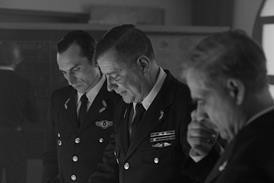Director Bryn Higgins and star Agyness Deyn talk about bringing a unique young woman to life in British drama Electricity.
Electricity isn’t a movie about epilepsy. It’s about a headstrong young woman on an important life journey, who happens to have epilepsy – we see that for her the disorder is not necessarily a curse, just a part of her identity.
“What is so beautiful about this role is that epilepsy is so different for every single person…the things that come out of it can be quite unique. So it’s about finding that uniqueness within the common thread,” says actress Agyness Deyn, who takes a daunting lead role in nearly every shot of the film.
The film, adapted from Ray Robinson’s novel of the same name, is about Lily O’Connor, a brash young woman who lives on the Northeast coast, embarking on a hallucinogenic journey to London to find her younger brother Mikey.
Stone City Films produces, and the BFI Film Fund also supported the production (the late Chris Collins championed the film and suggested Deyn for the role). The Wellcome Trust backed the film as its first feature film co-production, and advisors included The Epilepsy Society.
The film shot for six weeks in Newcastle and London. The cast also includes Christian Cooke, Paul Anderson, Alice Lowe, Lenora Crichlow and Tom Georgeson. The film premiered at the BFI London Film Festival in October and Soda Pictures releases it in the UK today.
Deyn, a former model who was named one of Screen’s 2013 Stars of Tomorrow Brits in LA, watched many videos of patients and worked closely during research, rehearsals and preparation with Dr Gonzalo Alarcon, one of Europe’s leading experts in epilepsy and a senior lecturer at King’s College London.
“It was so fun and so interesting,” she said of her work with the doctor. “I got from him this freeness, this physical freeness, because [seeing those kinds of physical movements] were so normal to him. It kind of was a really breaking point for me.” It was also a physically demanding performance, leaving Deyn bruised at times. She learned about the different kinds of seizures that affect each person differently – “It’s amazing, some of the circuits are quite violent looking, and some of them are quite happy,” she says of her visits to see real patients with Dr Alarcon.
Director Bryn Higgins says, “I have to say Aggy put in an enormous amount of work and research… It was frightening to see her [acting out a seizure] because it was very realistically and properly done, and that is I think due partly to the sessions with Dr Alarcon.”
Higgins was struck by the way Robinson’s book presented the brain disorder in a fresh light. “Epilepsy has a terrible history in terms of art and its portrayal, it’s generally linked to possession or psychosis - actually when you read about it, sometimes there is an extreme sense of ecstasy that can come with an epileptic seizure. It’s an enlightening thing and you live a different reality. That’s what the film I hope is about — we kind of get the privilege to travel very close with this really rather remarkable character who sees the world in a different way.”
Lily’s temporal lobe epilepsy is accepted as part of her life, as in the book, her motto is: “Thrash, get up, get on with it.”
Electricity was shot in a way to let the audience see Lily’s life as she experiences it, not as seen by outsiders. “The book never described her from the outside so whenever she’s having one of these hallucinations and these seizures, it switches to first person and that is how we have designed the film,” Higgins says. “We basically stuck right close to Aggy…We wanted to stay with her during her seizures, never seeing her from the outside, so needing to keep her arms and legs in shot.” DoP Si Bell used a stripped down Red Epic camera which kept the lens very close to Deyn’s head.
The film makes use of striking visual effects to enter Lily’s world. As Higgins says, “I thought we could make the film a beautiful looking thing — and that takes people by surprise. It is a very uplifting story in the end.”
Lily’s “primitive and unfiltered” side was an appeal for the actress, who has also appeared in Clash Of The Titans, Acid Burn and Pusher, and the Trafalgar Studios play The Leisure Society. “This will appeal to a lot of young women out there…What I learned from Lily is having no fear and standing up for who you are.”
Next up Deyn appears in Terence Davies’ Sunset Song, with another female character she says is “pretty full on as well…she starts strong and then becomes stronger.”







![In a whisper[17].jpg](https://d1nslcd7m2225b.cloudfront.net/Pictures/274x183/0/2/3/1472023_inawhisper17.jpg_579998_crop.jpeg)













No comments yet